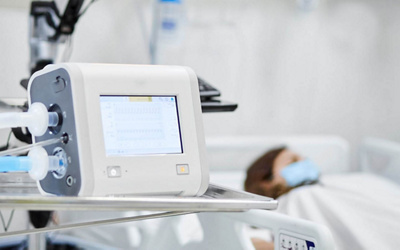How the highly trained ICU team at Mediclinic Midstream, led by specialist pulmonologist Dr Emmanuel Taban, helped a young patient survive COVID-19.
“My wife and I went to hell and back 15 times,” says Willie Opperman, whose son recently spent eight weeks in hospital fighting a severe case of COVID-19. “Before falling ill, Louis was a fit young man, an aspiring professional golfer who could ride 50km on a mountain bike with no problems. Now he is severely compromised.
He’s lost 40kg, has to walk with crutches and suffers from lack of feeling on his left side.” The Opperman family know it will be some time before 19-year-old Louis makes a full recovery. “But we are so grateful he survived this ordeal,” says Willie. “We wouldn’t wish this experience on anyone.”
In August 2021, Louis was admitted to Mediclinic Limpopo in Polokwane on low flow oxygen, which then progressed to the delivery of High Flow via Nasal Cannula, and finally, he needed support from a mechanical ventilator. He was first on non-invasive ventilation for about seven days but as he wasn’t improving, he was intubated and ventilated in Polokwane.
The next day he was transferred to Mediclinic Midstream in Centurion. Here, a highly trained ICU team, led by specialist pulmonologist Dr Emmanuel Taban, took over Louis’s care. “When his initial treating doctor phoned me to say he was continuing to deteriorate and his saturation level had dropped below 80% while on 100% oxygen, I knew he might not survive – whether he was transferred or not,” Dr Taban recalls. “We made the brave decision to air lift, despite such low oxygen levels.
When he arrived at Mediclinic Midstream on August 9, his oxygen saturation was down to 65% but improved to about 85% after an hour in hospital. We immediately did an X-ray of his chest on arrival and discovered bilateral pneumothoraxes, meaning both of his lungs had collapsed.” Dr Taban’s colleague, cardiothoracic surgeon Dr Daniel Struwig, sprang into action and placed bilateral intercostal drains (one on each side), which allowed the lungs to expand immediately. “Louis’ saturation continued to improve to about 90% while on 100% oxygen,” says Dr Taban. “Upon further testing, we also discovered he was in septic shock from a Salmonella infection, on top of the COVID-19.
In his case, the Salmonella had involved most of his other organs as well as the lungs.” At the time, Louis was not vaccinated against COVID-19 as he wasn’t eligible due to his age. “Getting vaccinated is the only thing that can save us from this deadly virus,” says Dr Taban. “As healthcare workers, we are very tired. It’s very important that people get vaccinated so we can claim back our lives. Louis is an example of why the younger population should get vaccinated. No one is truly immune to the devastating effects of COVID-19.” During his 50 days at Mediclinic Midstream, Louis presented with multiple complications, from recurring bilateral pneumothoraxes and multiple bouts of sepsis, to kidney failure.
Dr Taban and his team worked tirelessly to combat each while maintaining a multidisciplinary view of Louis’s case: Louis was also seen by physiotherapists, a speech therapist, an occupational therapist, and dieticians. “For the first two weeks, my wife and I were only able to look at Louis through the window of ICU,” Willie recalls. “We only knew he’d really turned the corner when they took him off sedation on 25 August – it was the best birthday present I’ve ever received.” On 28 September, Louis was discharged from Mediclinic Midstream to a step-down facility.
Dr Taban has nothing but praise for the dedicated ICU team who worked with him to save Louis’ life. “My colleagues Dr Dineo Maphanga, a fellow pulmonologist; Dr Cornel Engelbrecht and Dr Lee-Anne Godinho, specialist physicians; Drs Joubert and Maré, our two medical officers; as well as the allied workers – including physiotherapists, dieticians, psychologists and brilliant nursing staff – all played a role,” he says. “Mediclinic Midstream is a small hospital but it has a strong family spirit when it comes to managing our patients. Our motto is to never give up and it’s what drives us every day.”
Disclaimer: The information provided in this article was correct at the time of publishing. At Mediclinic we endeavour to provide our patients and readers with accurate and reliable information, which is why we continually review and update our content. However, due to the dynamic nature of clinical information and medicine, some information may from time to time become outdated prior to revision.

